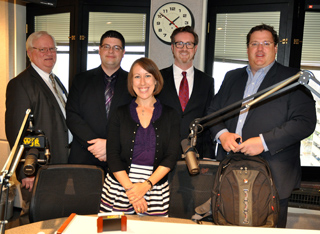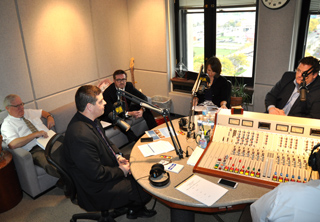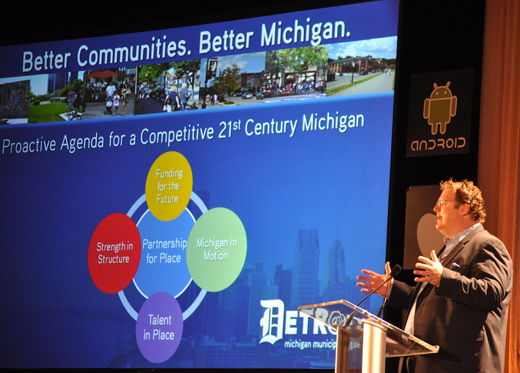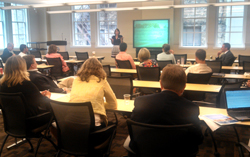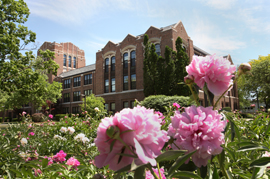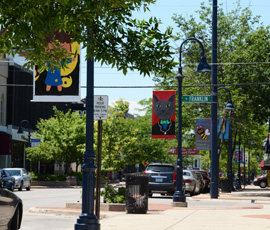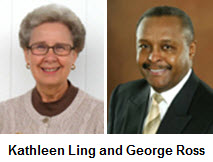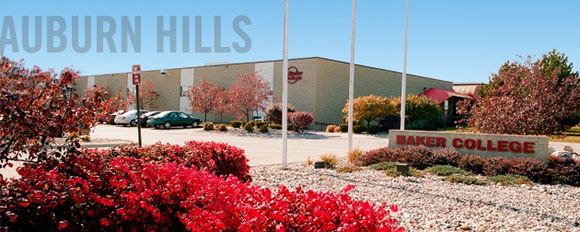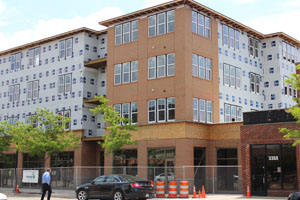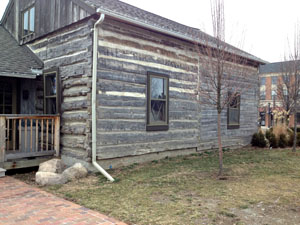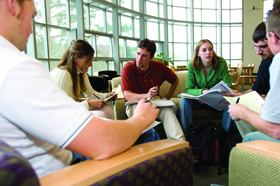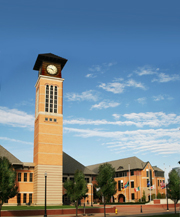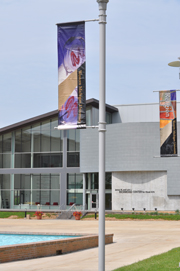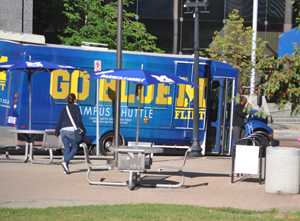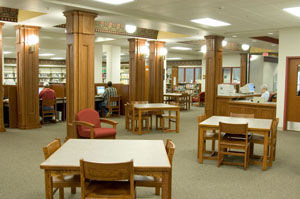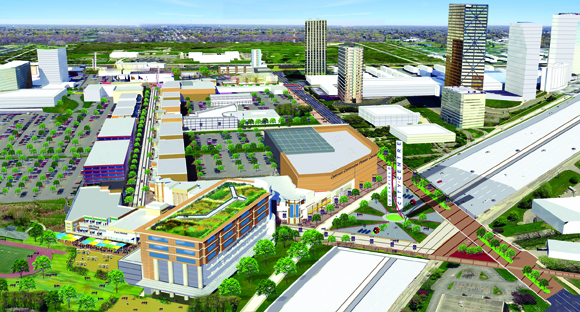
This birdseye conceptual view of the Southfield City Centre district is facing east from the north side of campus. Ideas include a plaza over Northwestern Highway, a “spine” of new office, retail, and housing development, and other attributes that make the district a destination for student activity, recreation, and socialization.
Significant redevelopment and enhancement of Lawrence Technological University’s Southfield neighborhood is under way and the beneficiaries are current and prospective students, their parents and guests, faculty, staff, alumni, and the thousands of other visitors who journey to campus each year.
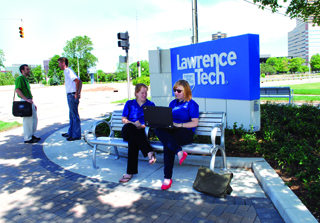
One of the first improvements for the Southfield City Centre district was the 2012 construction of a “gateway” plaza on the north end of LTU's campus, at the intersection where Civic Center Drive crosses Northwestern Highway/Lodge Freeway.
Nearly a dozen new restaurants and shops have sprouted on spaces that were formerly vacant or housed underutilized or empty office buildings that have been torn down. The new in-fill spaces are seeing heavy use by the LTU community as well as residential neighbors and 13,000 workers in the surrounding office towers.
Each day, Southfield’s base population of 75,000 residents balloons to 175,000 as business workers and executives head to offices in the city, many located in the towers adjacent to campus. Some 85 Fortune 500 companies have headquarters or offices here. Southfield is attractive because of its central location, great public services, and easy access to freeways.
Lawrence Tech is part of the Southfield City Centre district, (www.southfieldcitycentre.com) a roughly triangle-shaped area anchored by LTU’s 102-acre campus on the west, Evergreen Road on the east, Interstate 696 on the north, and Ten Mile Road on the south.
The district’s boundary extends outward from this triangle to include Southfield’s municipal complex which has a wide variety of amenities ranging from the city hall and its events pavilion, to the city library, hockey arena used by Lawrence Tech teams, a golf course, and more.
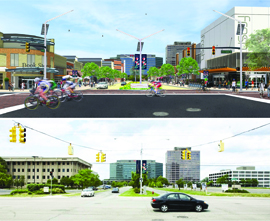
This “before-and-after” concept shows goals for the build-out of the City Centre district, including walkable and bicycle-friendly access to a variety of interesting shops and restaurants catering to city residents, area office employees, and the LTU campus community. East of LTU’s campus, this view is north from the intersection of Civic Center Drive and Central Park Boulevard.
In 1992, a special assessment district was created to provide for the operation, maintenance, promotion, and development activities within the City Centre district, including developing pedestrian amenities and facilitating economic development. LTU Vice President for Finance and Administration Linda Height serves on the citizens’ committee that helps oversee and encourage the district’s development and growth.
Creating a ‘college town’
Height, Dean of Students Kevin Finn, Campus Architect Joe Veryser, Associate Professor of Architecture Constance Bodurow, and others at LTU have partnered with Mayor Brenda Lawrence, the City Council, Southfield̓s City Planner Terry Croad, and corporate and business neighbors in the city to provide the types of amenities that attract and retain students and others, and build the 24/7 community and relationships that distinguish vibrant “college towns.”
“Southfield’s City Centre is becoming a vibrant and friendly place to live, work, and play. Its evolution is designed around people and not just cars, with restaurants, shops, offices, apartments, public spaces, cultural institutions, and recreation all within convenient walking distance,” said Rochelle Freeman, Southfield’s business development manager.
The overriding goal is reinvention of the district into a walkable, pedestrian-friendly environment designed around people’s interests and lifestyles. The area’s market demand, employment base, and civic center, all within a 10-minute walking radius, creates a unique opportunity to develop a lifestyle center with broad appeal to restaurants and retailers.
Integrating town and gown

Nearly a dozen new stores and restaurants have sprouted in the City Centre district over the past several years, providing students and campus guests with a variety of interesting options.
Lawrence Tech took the lead in the first phase of a comprehensive array of public infrastructure improvements and pedestrian amenities including new pathways, decorative crosswalks, bus shelters, benches, trash receptacles, and bike racks. Last year, the University helped fund improvements at the northeast corner of the campus that connect, via Civic Center Drive (10 1/2 Mile Road) to the rest of the district.
North of Civic Center Drive and east of campus, a former office building is being converted by a private developer into “Arbor Lofts,” providing loft-style apartments that are expected to appeal to a youthful clientele. Lawrence Tech has sublet 12 of the units (48 beds) to accommodate upperclassmen seeking to live on or near campus. LTU’s two apartment-style housing centers on campus have been filled beyond capacity for the past two years.
“LTU has come a long way from being a commuter university to providing a robust residential campus with active student life and a strong connection to the surrounding community,” Finn said. “This fall we will have nearly 1,000 students living on or near campus. We run a weekend shuttle bus within the City Centre and have worked with several businesses there who offer student discounts. ”
Visualizing the future

The Southfield City Centre district (concept view) facing west from the municipal complex.
To help visualize and plan for future enhancements in the district, the City Centre board and City Planner Croad have retained studio[Ci], a design lab in LTU’s College of Architecture and Design founded in 2008 by Bodurow. It engages a trans-disciplinary team of professional architects, urban designers, civil and environmental engineers, as well as students and faculty.
“Our faculty/student design team focuses on density, infrastructure, mobility networks, and net zero energy,” said Bodurow. “We then create land use, urban design, green infrastructure, and architectural proposals utilizing digital technology.”
Phase I of studio[Ci]’s work, completed last summer, includes urban design plans, programming, and visualizations for close to one million square feet of mixed-use development (based on a commissioned market study and including retail, commercial, institutional, and residential development) along with public realm and non-motorized improvements in the City Centre. The team is now working on Phase II, focusing on developing the architectural and public-realm site plan.
A comprehensive agenda
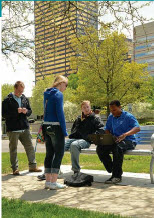
Pedestrian and transit access and easy walkability are already being realized as the Southfield City Centre district evolves and grows.
While everything is conceptual, Croad said the exercise helps city leaders, residents, business owners, and others visualize what is possible. These concepts, all dependent on funding, include a pedestrian- and bicycle-friendly east-west “spine” of future development that features ground-floor retail, tech-transfer space, and loft-style housing; “day lighting” the now buried Rouge River tributary that traverses the City Centre; a “civic square” at the corner of Evergreen and Civic Center Drive that will provide space for markets, festivals, and other public events; and even a “deck” plaza over Northwestern Highway north of Civic Center Drive to provide a connection between the campus, other parts of the district, and municipal complex.
In 2014, one of the most ambitious and costly public improvements in the district to date will be the complete rebuilding and transformation of Evergreen Road into a boulevard with a landscaped median, bike path, bioswales, and pedestrian-friendly amenities. The $10–15 million project is being funded by the City Centre, the City of Southfield, and SEMCOG.
“Student life at great colleges and universities is closely tied to the activities and opportunities for socialization, recreation, and just plain ‘fun’ surrounding the campus,” Finn said. “We are pleased to partner with the city and our corporate neighbors in this exciting process that will result in an ever better collegiate experience for our students and others at the University.”
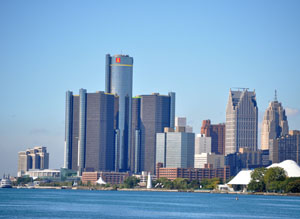 The Michigan Municipal League issued the following media statement regarding a U.S. Bankruptcy Court ruling Tuesday, Dec. 3, 2013, in the city of Detroit bankruptcy case. The statement was by Utica Mayor and Michigan Municipal League President Jacqueline Noonan:
The Michigan Municipal League issued the following media statement regarding a U.S. Bankruptcy Court ruling Tuesday, Dec. 3, 2013, in the city of Detroit bankruptcy case. The statement was by Utica Mayor and Michigan Municipal League President Jacqueline Noonan:







